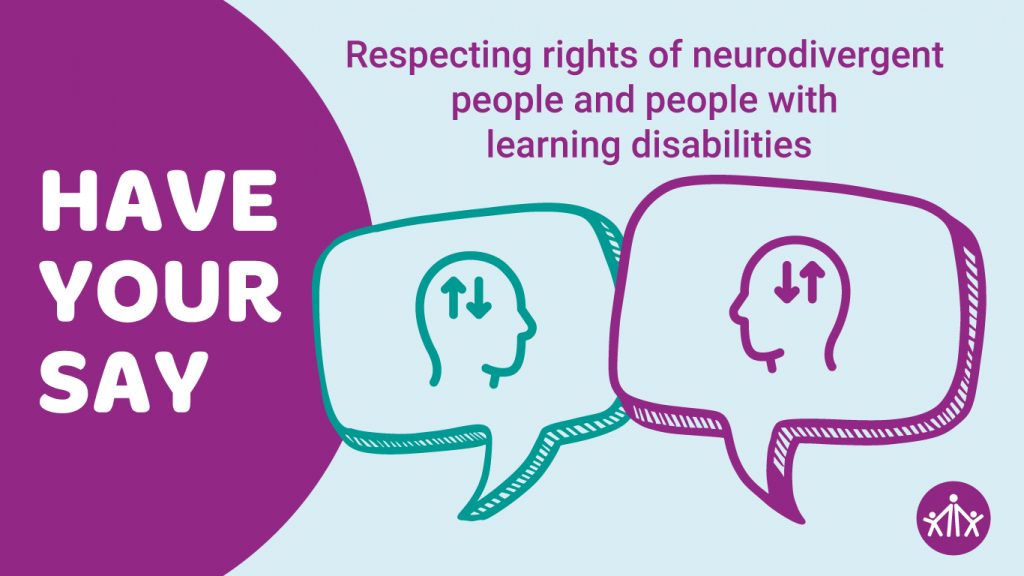Respecting rights of neurodivergent people and people with learning disabilities
OPFS wants to know what you think!

12/04/2024
News
The Scottish Government are consulting on a new ‘Learning Disabilities, Autism and Neurodivergence Bill’. The bill aims to make sure that neurodivergent people and people with learning disabilities are treated in the same way and have the same opportunities as everyone else.
The bill aims to support.
People with learning disabilities – A person with a learning disability finds it more difficult to learn, understand and do things compared to other people of the same age. They may need support to do things day to day and they may also have other medical conditions such as epilepsy or Down’s Syndrome.
Neurodivergent person– A person whose mind works in different ways to the minds of other people.
Autistic person – A person who is diagnosed with autism or who is being assessed.
One Parent Families Scotland want to hear from single parents so that we can include your views in our response.
These issues may affect you or / and your children. There are three areas we want your views on:
Inclusive Communication
Inclusive Communication means sharing and receiving information in a way that everybody can understand. This could be a video, Easy Read options or it could be pictures.
The Scottish Government want to better protect and uphold rights around inclusive communication and information, so everyone is able to get information in a way that they want and understand. Ideas include :
Proposal 1: Alternative means of communication Provide for neurodivergent people and people with learning disabilities to request access to alternative means of communication. This could mean being able to request an online or telephone meeting rather than face to face, or a telephone call instead of a letter, or other forms of communication.
Proposal 2: Easy-read Better access to easy-read versions of all public facing communications and documents made by public authorities. This could include a broad duty to make them available on request and an automatic duty to provide them in certain circumstances.
Proposal 3: Neurodivergent and learning disabilities strategies To require local strategies to be produced, this could apply to local authorities, NHS Boards and integration authorities, and potentially other public bodies if appropriate. The Bill could provide the Scottish Government with power to direct what these strategies should cover.
Getting a Job
Having a job can help you to live more independently. Neurodivergent people and people with learning difficulties can find it more difficult to get a job and stay in work. The Scottish Government want the bill to ensure:
- The places where people work are more helpful to who are Neurodivergent or have Learning Disabilities.
- Employers listen when they are asked for support.
- Neurodivergent people and people with Learning Disabilities are encouraged and supported to take up employment
Education
Neurodivergent children and young people and people with learning difficulties should be able to reach their full potential and live happy and fulfilling lives. Without the right learning experiences and support these children and young people are likely to be disadvantaged. .
The Scottish Government want the bill to ensure neurodivergent children and young people, and children and young people with learning disabilities, their families have their right to education fulfilled and they don’t miss out on reaching their full potential, which may contribute to poorer outcomes in adult life. Ideas include:
Proposal 1: Strategies and reporting requirements: to create a new requirement for education authorities and schools to include in their plans and reports how the specific needs of neurodivergent pupils and pupils with learning disabilities have been considered and are being met.
Proposal 2: Mandatory training for teachers, practitioners and other educators : Teachers and other people who work in nurseries and schools are well trained to teach neurodivergent children and young people and people with learning disabilities.
Proposal 3: Data,: There is data available from education authorities on learning disabilities, autism and dyslexia but it isn’t available on ADHD, FASD, Dyscalculia and other neurodivergent conditions. To better understand all neurodivergent children and young people and their experiences and outcomes in relation to education this data could be collected and published.
Please complete our short survey below.